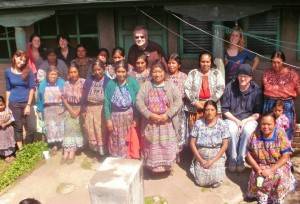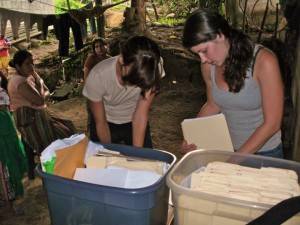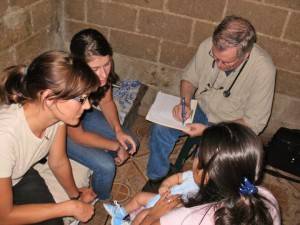Editor’s note: The group Wuqu’ Kawoq was recently featured on ABC during and ABC News 20/20 segment. Check the previous links for more information on this social work organization.
Smile Politely: Hey, Claire. How is it being back in Guatemala?
Melvin: Hey there! It’s pretty good. I just got in this afternoon… can’t complain about the 77 degree weather here to greet me.
SP: That sounds really nice right now. Is it pretty much always warm there?
Melvin: The climate has two major seasons, one rainy and one dry. During the day it is never colder than 60 degrees all year but at night it can get pretty cold where I work in the mountains. I LOVE the climate. During the rainy season, it nearly monsoons every day and, if you like rain, it sounds great on the tin roofs. When it is not raining it is absolutely gorgeous out! On the coastal lowlands it gets pretty sweaty, but I’m lucky and work in the mountains, so it stays warm and doesn’t get humid… there are also volcanoes everywhere… and beautiful mountains.

SP: That sounds like paradise, but I know that’s not the case. There are some major problems that are prevalent in Guatemala. I was told that you are working specifically with impoverished people and their nutritional needs while you’re there. Or do I have that wrong?
Melvin: I work with an organization called Wuqu’ Kawoq (WK) that focuses on building health services and cultural support for the Mayan populations in Guatemala. These populations are also (and not coincidentally) the most impoverished. By cultural support I mean that we provide these services in their native Mayan language. We currently work with Kaqchikel and K’ichee’ speaking populations. WK is a fairly small and new organization but we already have a number of programs working to improve healthcare for these populations.
SP: Are you working solo or with others from WK?
Melvin: As of right now I work alone on my project but with lots of support from the executive board. It works really well because I have a lot of freedom and a lot of their trust to execute this program on my own with the help of their ideas and feedback. I do live with another intern though. She works on another project but we use each other a lot to bounce ideas.
SP: How did you get into this? You went to the University of Illinois, right?
Melvin: My background at the U of I is a degree in cultural anthropology and a concentration in social work. This organization brings the two ideas together, strengthening both access to immediate needs while also supporting a group’s indigenous culture that is being lost over time.
SP: How did you get hooked up with WK?
Melvin: I started volunteering with WK in 2009 for 2 weeks of clinics in different locations. I continued to be interested in their work and was asked to intern before I graduated in 2010. I accepted and also enrolled in their first 2 week Kaqchikel course in June of 2010, which is when I began preliminary work for the organization as well.
SP: That sounds pretty intense. How long will you be in Guatemala then?
Melvin: There is no exact time limit of how long I will be here, because it depends on my project’s progress. Most likely I will return to the states after WK’s second annual Kaqchikel course that I am taking again in June.
SP: So you’re part of an extensive, ongoing program. Is your work part of WK’s main focus in Guatemala?

Melvin: Our biggest program right now is the program working against malnutrition in children. We have this program going in about 5 locations. It combines a number of facets, such as regular documentation of height/weight for children under 5 and administration of vitamin resources, particularly one that contains a lot of iron because anemia is very common. We also administer nutritional supplements and have worked to improve water conditions in locations to reduce the malnutrition caused by parasites and bacteria in the water.
SP: Yeah, that doesn’t sound all that great. What is your specific role?
Melvin: I am currently working with them as a field intern/program organizer (title not so important). It is a one year long commitment in which I help to maintain existing programs and needs, but I also am working on my own project for WK, which is focused on women’s sexual and reproductive health and sexual rights.
SP: Can you tell me some details about your duties?
Melvin: My duties can largely be described as a community organizer. The idea is to build a program that can sustain itself within the community without outside help. Right now, for the women’s health project, I have been working to create a program of sexual and reproductive health classes and clinics for STD testing and treatment, cervical cancer screening, and contraception provision. These services are otherwise rather inaccessible to the women in these communities. I have been working in two communities in the department of Sacatepéquez, Santiago and San Pedro, and this is where the programs will start, but we hope to see them grow to other locations. Thus, I have been finding interested women to maintain the program (such as our class teacher and community volunteers), having community meetings, and coordinated schedules for these classes and clinics.
SP: It sounds like you are all doing some great work over there. How do you see those experiences transferring? Do you think you’ll be able to apply what you learn there to situations back in the states?
 Melvin: I will definitely be able to apply what I’ve learned so far. For one, I can speak Spanish now, which is a huge plus, and I am trying to learn Kaqchikel. Also, I plan to go to law school to study international law and cultural/civil rights law, so it is very good to see how these institutions actually exist (or do not exist) in different areas of the world. I hope to continue as a Spanish interpreter either in a hospital or legal office when I return to the states as well.
Melvin: I will definitely be able to apply what I’ve learned so far. For one, I can speak Spanish now, which is a huge plus, and I am trying to learn Kaqchikel. Also, I plan to go to law school to study international law and cultural/civil rights law, so it is very good to see how these institutions actually exist (or do not exist) in different areas of the world. I hope to continue as a Spanish interpreter either in a hospital or legal office when I return to the states as well.
SP: Do you feel like you’re making an impact? Are there noticeable changes?
Melvin: It is possible to see some of the changes that are slowly occurring. Where WK has put in water filter systems, it is already possible to see the significant reduction of cases of diarrhea and parasites in children. It’s difficult to say with my project how the progress is going because we’ve only had meetings this far, but I will know very soon.
SP: What’s the most vivid experience you’ve had so far?
Melvin: What has been most memorable from my project has been simply the community responses. These women come to meetings so excited and so interested it truly reinforces that there is a great need for these services. My favorite moment was when two men came to one of the meetings in full support. This is EXTREMELY rare in Guatemala. Most men are anti-contraception/family planning, and do not promote women’s sexual rights. This made me really excited for what is to come from these communities.
SP: It’s great that you’ve seen that kind of feedback on something you’re really putting your heart into. I wish the best of luck to you all. Before we go, do you have any other specific goals in mind?
Melvin: My goals for this year are to support the work that my organization does, and ideally, create a program that will be sustained after I leave. These communities can lift themselves up with a little bit of resources (monetary/medical/structural) that we can provide.








